When the coronavirus pandemic struck our nation, many Americans fell victim to the economic shutdown. “More than 44 million people have filed for initial unemployment benefits since mid-March,” marking the largest loss of jobs our country has ever seen. Millions of individuals were forced to rely on personal savings and government assistance, while small businesses were given limited options for support. But as a people, we are resilient, and if nothing else, we can learn from this crisis to be better prepared for the next. The COVID-19 pandemic has taught us that there is perhaps nothing more important than an emergency fund for weathering uncertainty and financial destitution.
An emergency fund, or a rainy day fund as many of us call it, is just what it sounds like–a sum of money put aside in preparation for a setback. But emergency funds are beneficial not only during emergencies. Below, I’ve detailed just a few scenarios to describe why emergency funds are an absolute necessity today.
Slumps
We’ve all experienced slow seasons where our revenue takes a hit for factors beyond our control, and emergency funds can be used to get by without going into the red.
Picture this: your business is thriving, you’ve finally paid off the small business loans that helped you launch your company, and you’ve just hired two new support staff members. Then reality hits, and the local economy stoops into a minor recession. People stop buying and start saving, and your business experiences significantly lower profit margins than you prepared for. Now, you’re forced to make the difficult decision of either laying off your newly hired team members, or taking out another loan to cover expenses in the interim.
An emergency fund would have eliminated the need to choose between borrowing money and firing employees, proving a cushion for your business while the economy recovers.
Unexpected Opportunity
A more welcomed use for an emergency fund–which is not so much an emergency — is an opportunity for expansion or growth of your business.
Imagine you have been planning to expand your business in the next five years by opening a second storefront, thereby doubling your staff. You have kept an eye on commercial leases available in your desired location, and the perfect spot just became available. On top of that, it’s well within your budget and too lucrative an offer to pass up. But without the down payment necessary to secure the space, you run the risk of losing the ideal location for your second storefront.
With an emergency fund, however, you would have been able to immediately close the deal on a second business location and begin the process for hiring staff and renovating the unit.
Crises
The last, and most timely reason why every small business owner needs an emergency fund, is for the crises that no one can predict or ever truly prepare for.
If this COVID-19 pandemic has taught us anything, it’s that you can never have too much money in your rainy day fund. But aside from crises that affect the global economy, it is important to remember that even we business owners have personal crises of our own to deal with every now and then. No matter what form said crisis may take on, it is imperative that we maintain a safety net to ensure business stability while putting out fires on the home front.
So now that you understand the importance of emergency funds, you’re probably asking yourself, just how much do I need in my fund? I recommend having somewhere between 6-12 months worth of emergency funds which would cover any monthly expenses and salaries for your employees. Though it may seem like a lot, we are already on month five of the coronavirus pandemic, and with talks of a second wave potentially hitting late fall to early winter, it’s now more important than ever to save up in preparation for the worst case scenario.
And if you think you’re immune to these possibilities, think again, because even the smartest small business owner has a safety net for unforeseen circumstances. Trust me, you won’t regret having an emergency fund on hand even if you never have to use it.
For more information on where to start in terms of an emergency fund and how you can receive financial assistance during our current crisis, visit my previous blog post.
Stay tuned for our next blog regarding how to establish an emergency fund for your business!



 Free Training…
Free Training… Sign Up Below…
Sign Up Below…